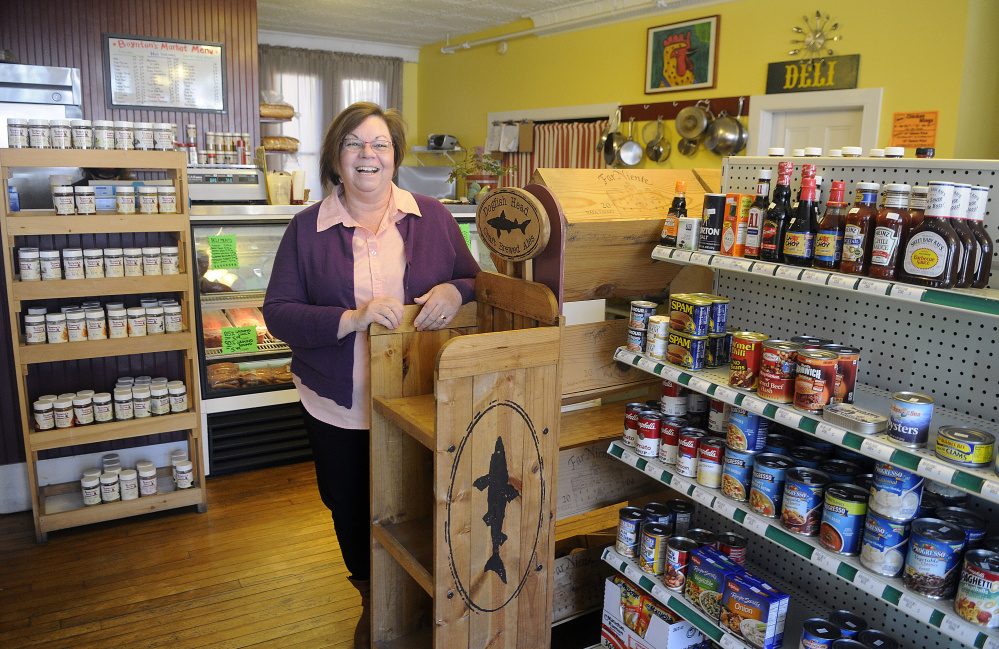HALLOWELL — Ruth LaChance looks at the Stevens School redevelopment plan not just as a Hallowell resident, but as a downtown business owner and as the president of the Hallowell Board of Trade. And she is clear about her support for developer Matt Morrill’s plan, with one large caveat.
“There’s no bones about it, because downtown Hallowell is bustling and we want to keep it that way,” LaChance said at Boynton’s Market, which she co-owns and helps operate with her husband, Bob. “If he wants the support of the businesses, he has to say no retail.”
Morrill, who purchased the 54-acre Stevens Commons complex from the state in April for $215,000, submitted his master plan for the site last month and is awaiting its initial approval of completion by the city’s Planning Board. The plan calls for a mixed-use development featuring affordable senior housing, commercial and residential space and small, clustered subdivisions.
“Our plan shows a variety of conceptual uses, and I understand there may be things that may not meet everybody’s desires,” Morrill said in an email Saturday, “but we want to engage the community and the Board of Trade in the process so that we can arrive at a set of mixed uses on the campus that best serves the needs of the community.”
Hallowell’s comprehensive plan does not allow for retail usage at the former Stevens School site, so the city would have to amend the related ordinance. LaChance is worried that the city will drift from the intentions of the comprehensive plan.
“Retail will kill us,” she said emphatically. “We are pretty clear that we don’t need or want another coffee shop, another flower shop or another restaurant up there.”
LaChance said there is support among the Board of Trade members for the affordable-housing aspect of Morrill’s plan. There is so much employment along Water Street, she said, and businesses constantly are searching for affordable places where employees can live.
“We all understand that with the aging population, we’re always going to need senior housing, and the biggest relief will be affordable housing not just for the elderly, but for everybody,” she said. “We’re all for the housing plan.”
But LaChance just can’t get past the idea of retail usage at Stevens Commons and admits she’s “extremely concerned.”
In the months after he acquired the property, Morrill and the city have discussed a $1 million bond that would allow for infrastructure improvements to the campus’ roads, of which the city then would take ownership. Bonding would have to be approved by voters, something LaChance vows to not support as long as retail space is part of Morrill’s plan.
“If this developer wants a bond issue to pass, and if he wants the support of the Board of Trade, we have to hear that there will be no retail,” she stated.
Aside from the competition, LaChance said it’s hard to get people to “come back down” to Water Street if they get used to shopping at Stevens Commons, especially during the Water Street reconstruction set to begin in 2018.
“If they have another place to go park and get similar items, we’re going to be on the short end down here,” LaChance said. “The road construction is going to be a big deterrent to people, and we’ll need all the help we can get.”
Kim Davis, of Scrummy Afters Candy Shoppe on Water Street, isn’t worried about another candy store opening at Stevens Commons. But she is concerned, like LaChance, that people will forget about shopping in downtown Hallowell if they can get what they need at Stevens Commons.
“Competition is good, but if they go to Stevens (Commons) where it’s easy to get in and out of, people would bypass us to go there,” Davis said. “Then what? Pretty soon an art gallery would go there? It’s endless, and the city as a whole has to decide what they want.”
Contrarians say that any new business coming to Hallowell is good business, but Davis said that’s not true in her mind and mentioned how officials from Augusta said something similar about their downtown.
The candy store owner also is concerned about the new development’s tax implications of. When it was owned by the state, the city received no tax revenue from the campus. She wonders whether the senior housing or affordable housing residents or property owners would be adding to the tax coffers.
“You’d have more people using services and going to the schools, but we’d be no further ahead,” Davis said. “Property taxes and other taxes would go up to sustain those services. I’d hate to see that happen here.”
People are so anxious to get any money in, Davis said, that they don’t look at the long-term effect on the city and its residents. Some might see the property and think that it’ll help lower taxes, but Davis said “it never does. It never works out that way.”
LaChance said Morrill attended the Board of Trade meeting in July, and there was a little discussion about his plans. Morrill, of Grand View Log and Timber Frames in Winthrop, said they are just at the beginning of vetting the appropriate mixture of residential and nonresidential uses with the Planning Board and then the City Council.
Interim Code Enforcement Officer Dick Dolby, who spent more than 20 years leading the code enforcement office in Augusta, has been reviewing the Stevens Commons master plan since it was submitted in mid-September. The Planning Board is expected to take up the issue at its next meeting, which is scheduled for Oct. 19.
Send questions/comments to the editors.



